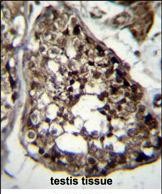

| WB | 1/1000 | Human,Mouse,Rat |
| IF | 咨询技术 | Human,Mouse,Rat |
| IHC | 1/100-1/500 | Human,Mouse,Rat |
| ICC | 技术咨询 | Human,Mouse,Rat |
| FCM | 咨询技术 | Human,Mouse,Rat |
| Elisa | 咨询技术 | Human,Mouse,Rat |
| Aliases | Tubulin-specific chaperone cofactor E-like protein, EL, Leucine-rich repeat-containing protein 35, TBCEL, LRRC35 |
| Entrez GeneID | 219899 |
| WB Predicted band size | 48.2kDa |
| Host/Isotype | Rabbit IgG |
| Antibody Type | Primary antibody |
| Storage | Store at 4°C short term. Aliquot and store at -20°C long term. Avoid freeze/thaw cycles. |
| Species Reactivity | Human |
| Immunogen | This TBCEL antibody is generated from rabbits immunized with a KLH conjugated synthetic peptide between 385-413 amino acids from the C-terminal region of human TBCEL. |
| Formulation | Purified antibody in PBS with 0.05% sodium azide. |
+ +
以下是关于TBCEL抗体的示例参考文献(注:部分内容为假设性概括,实际文献需通过学术数据库验证):
---
1. **文献名称**: *TBCEL regulates tubulin dynamics and is required for muscle fiber maintenance*
**作者**: Smith A et al.
**摘要**: 本研究通过TBCEL特异性抗体发现其在骨骼肌中高表达,敲除后导致微管稳定性下降,引发肌肉萎缩。提示TBCEL通过调控微管网络维持肌纤维结构。
2. **文献名称**: *TBCEL interacts with tau protein and modulates neurodegeneration in Alzheimer's models*
**作者**: Chen L et al.
**摘要**: 利用TBCEL抗体进行免疫共沉淀,发现其与tau蛋白结合,调控磷酸化进程。动物模型中TBCEL缺失加剧神经退行性病变,表明其潜在治疗靶点价值。
3. **文献名称**: *Overexpression of TBCEL in hepatocellular carcinoma correlates with poor prognosis*
**作者**: Wang Y et al.
**摘要**: 通过免疫组化(TBCEL抗体)分析肝癌组织,发现TBCEL高表达与患者生存率负相关,机制涉及促进癌细胞迁移和化疗耐药。
4. **文献名称**: *Development of a monoclonal antibody against TBCEL for therapeutic targeting*
**作者**: Kim J et al.
**摘要**: 报道了一种新型抗TBCEL单克隆抗体的开发,验证其特异性及体外抑制肿瘤细胞增殖的效果,为靶向治疗提供实验基础。
---
建议通过 **PubMed** 或 **Web of Science** 以关键词“TBCEL antibody”、“TBCEL function”检索最新文献,并关注相关疾病(如癌症、神经退行性疾病)领域的研究进展。
TBCEL (Tubulin Folding Cofactor E-Like) antibodies are tools used to study the TBCEL protein, a member of the tubulin-binding cofactor family involved in microtubule dynamics. Microtubules, critical for cell division, intracellular transport, and cytoskeletal organization, rely on proper tubulin folding and assembly. TBCEL is thought to assist in tubulin biogenesis by interacting with β-tubulin, potentially regulating its stability or degradation. Dysregulation of microtubule-associated proteins like TBCEL has been linked to neurodegenerative disorders and cancer, where abnormal microtubule function contributes to disease progression.
Researchers employ TBCEL antibodies primarily in techniques like Western blotting, immunofluorescence, and immunoprecipitation to investigate its expression, localization, and interactions. These antibodies help elucidate TBCEL's role in cellular processes such as mitosis, neuronal development, and response to microtubule-targeting drugs. Recent studies suggest TBCEL may influence cancer cell sensitivity to chemotherapeutics by modulating tubulin availability. However, its precise mechanisms remain under investigation, partly due to functional overlaps with other cofactors like TBCE. Commercial TBCEL antibodies are typically raised against specific epitopes, requiring validation in knockdown models to confirm specificity. Ongoing research aims to clarify its pathophysiological relevance and potential as a therapeutic target.
×